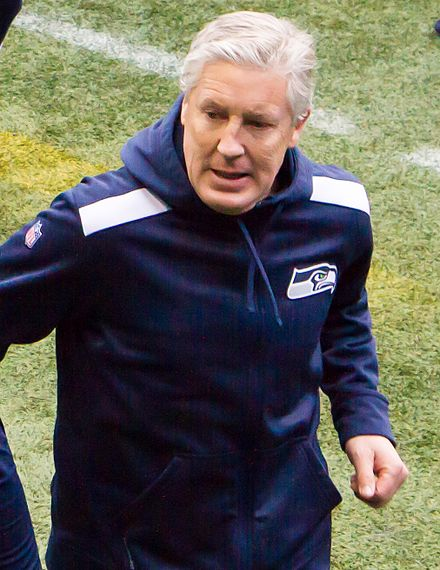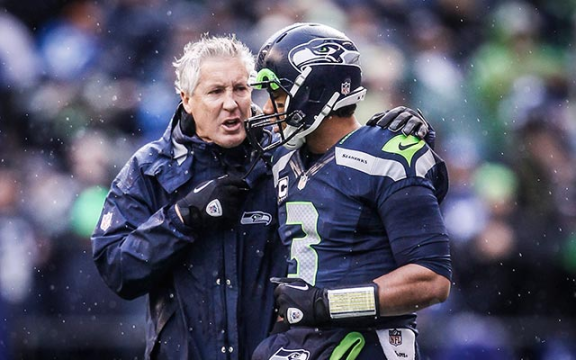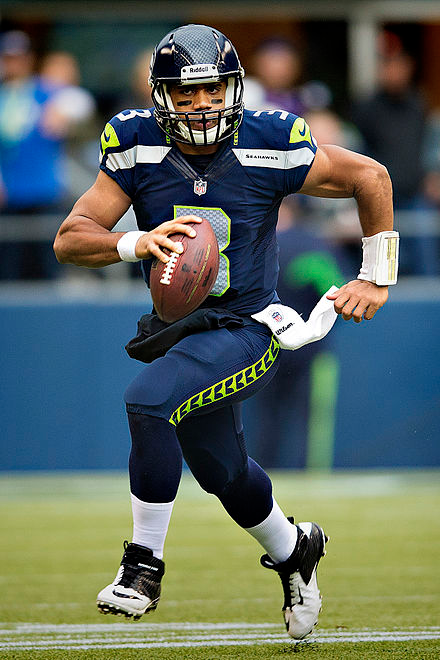
Coach Pete Carroll brought a new approach to the Super Bowl champion Seattle Seahawks.
Photo courtesy of Wikipedia.
Pete Carroll had heard it for years and right up until Super Bowl game time. The ridicule. The doubt. The derision. Pete Carroll’s too much of a players’ coach. That rah-rah style might work at USC, but it won’t work with grown men in the pros. Seattle’s too lax to win a championship. Now, after having shellacked the Denver Broncos’ supposedly juggernaut offense in Super Bowl XLVIII, Carroll and his Seahawks have sent those critics scurrying into the shadows. Turns out his careful approach to coaching—a potent blend of growth mindset, mindfulness techniques, and positive reinforcement—actually does gain traction on the field. Turns out you don’t have to scowl first to laugh last.
Back at the beginning of the season, Carroll detailed for ESPN the Magazine how he had chosen a different path. He knew that many thought him a pushover and that his detractors could point to a questionable track record. He’d been fired by the Jets in 1994. The Patriots had dismissed him after three seasons of seeming overmatched. And, though he’d had success at USC where he won two national championships, he left there under a cloudstorm of controversy too. Still, in the face of that criticism, he stayed strong and built a program that matched his mode. In a world of aggressive hits and hard-ass reprimand, he opted for systematic kindness: “I wanted to find out if we went to the NFL and really took care of guys, really cared about each and every individual, what would happen?”[1]
Growth Mindset
That generous slant shows up for the Seahawks in several ways, including Carroll’s commitment to a growth mindset. He focuses squarely on improvement rather than on native talent, exhorting his players, coaches, and staff to “Do your job better than it has ever been done before.”[2] He and his GM John Schneider cleared out employees who planted their feet in a fixed mindset mud and instead brought in guys willing to grow. That included Russell Wilson, the 5’11” quarterback who’d heard a few nay-sayers of his own and now-All-Pro cornerback Richard Sherman who had come into the league as a lightly-regarded 5th-round pick. It also included Tom Cable, an assistant head coach earlier known for his testy demeanor who now feels he’s found a better way to work with players:
If I go ballistic on a guy because he dropped his outside hand or missed an underneath stunt, who is wrong? I am. I’m attacking his self-confidence and he’s learning that if he screws up, he’s going to get yelled at. If you make a mistake here, it’s going to get fixed.[3]
For everyone throughout the organization, the approach stays the same. Set goals. Reach goals. Learn from mistakes.
The principle even applies for significant errors in judgment. When second-year defensive stopper Bruce Irvin received a four-game suspension for a positive test for banned substances last May, Carroll coached Irvin to take responsibility for his actions and apologize to his teammates and to the league. “The fact that that happened to Bruce is a gift for the next guy,” Carroll reported. “He made a poor choice and got hammered by it so the next guy won’t have to go through with that.”[4]
When Sherman ignited a firestorm with an on-air rant following the NFC Championship, he found his coach taking a similar approach:
I haven’t exactly earned straight A’s in the [avoiding controversy] department lately, but [Coach Carroll] sees it as a learning experience, just like the games. He finds the positives when we lose, in addition to the things we can improve on.[5]
Mindfulness
Early on in his tenure with the Seahawks, Carroll got his athletes practicing yoga as a way to build flexibility and core strength. He also knew it would help them develop focus and concentration. What started as an experimental program became a mandated requirement, with players like Wilson leading the charge for even more mental preparation: “We talk about being in the moment and increasing chaos throughout practice, so when I go into the game, everything is relaxed.”[6]
The Seahawks now have a full-time sports psychologist on staff and a more thorough investment in mindfulness that’s taken root across the squad. Offensive tackle Russell Okung has also jumped fully on board:
Meditation is as important as lifting weights and being out here on the field for practice. It’s about quieting your mind and getting into certain states where everything outside of you doesn’t matter in that moment. There are so many things telling you that you can’t do something, but you take those thoughts captive, take power over them and change them.[7]
The mindfulness helps the athletes let go of regrets from the past and anxieties for the future so they can stay fully focused on the intense demands of the present.
Positive Reinforcement
Carroll and his coaches amplify the team’s growth mindset and commitment to mental preparation by employing the foundational principle of positive reinforcement: reward movement toward the behavior you want and ignore the rest. That means more than offering empty praise. It means giving timely feedback to focus players on doing the right thing now rather than having done the wrong thing in the past. “We don’t feel like we benefit from [harping on errors],” Carroll says. “We want to tell them the best thing we can tell them as quickly as we can. It isn’t necessary to scream at them or yell at them. There are other ways to do it.”[8]

“Here’s what you’re doing right, Russell.”
Photo: http-//cbssports.com/images/blogs/carroll-wilson-happy.jpg.png
Though the league sees Carroll as a “players’ coach”—and his team members sing his praises—he’s no undisciplined pushover. There’s a backbone of intention behind the positivity. Linebacker and team captain Heath Farwell makes the argument: “[Coach] Carroll is respected by his players because of his clear teaching methods and his positive-reinforcement approach.”[9] ESPN NFL Analyst Eric Allen echoes the point: “Players’ coaches give you tools that you can use to be successful—so that no matter where you are, you’re able to understand the game—you grow as a player—you grow as a person. They prepare you and give you an opportunity to be a better player and then hold you accountable.”[10]
Multiple Fibers, Strong Rope
Pete Carroll’s not the first coach to preach the benefits of positivity, but he is the first to succeed on such a grand scale. And that success derives directly from his belief in his multi-strand vision. “[Carroll isn’t] coaching in the Super Bowl because he’s a nice guy,” wrote Sherman. “He’s here because he’s pulling off the most unique philosophy in football…Even when he finished 7-9 two seasons in a row in 2010 and 2011, coach Carroll stayed true to himself and the things he believed in, because it was finally his chance to do things his way.”[11]
Start with the life-changing shift to a growth mindset and clear out the deadbeats. Develop the discipline of mindfulness meditation. And teach with the targeted technique of positive reinforcement. Braid those fibers into a single rope and you’ve got the strength to reach the highest summits, no matter how loud the nay-sayers grow. Quarterback Wilson wisely acknowledges that “Other teams aren’t like this. We do stuff different here.”[12] For this year’s Super Bowl champion Seattle Seahawks, that difference—Pete Carroll’s systematic commitment to positivity and kindness—made all the difference.
Congratulations, Coach, and thanks for the inspiration.
Thanks to the following articles for their insights and quotations:
“A Love Letter to Coach Carroll” by Richard Sherman
“Lotus Pose on Two,” by Alyssa Roenigk, ESPN The Magazine
“Pete Carroll voted most popular,” by Terry Blount, ESPN.com
“Pete Carroll’s Coaching Playbook: 5 Takeaways for Leaders and Managers” by Victoria Alzapiedi
“Seattle Seahawks Changing Future of Football with Yoga and Meditation,” by YD
[1] “Lotus Pose on Two,” by Alyssa Roenigk, ESPN The Magazine
[2] Roenigk, ESPN The Magazine
[3] Roenigk, ESPN The Magazine
[4] Roenigk, ESPN The Magazine
[5] “A Love Letter to Coach Carroll” by Richard Sherman, for CNNSI.com
[6] Roenigk, ESPN The Magazine
[7] Roenigk, ESPN The Magazine
[8] “Pete Carroll voted most popular,” by Terry Blount, ESPN.com
[9] Blount, ESPN.com
[10] “Pete Carroll’s Coaching Playbook: 5 Takeaways for Leaders and Managers” by Victoria Alzapiedi
[11] Richard Sherman, for CNNSI.com
[12] Roenigk, ESPN The Magazine



Well said Ted! I see many of the same qualities in your own coaching and agree that the positive coaching road less traveled often leads to superior outcomes, although it can and does take time to build that ethos within the team/system. Peace! Ken
Thanks, Ken.
Indeed, it’s an approach that may not get quick results, but over time builds a completely different kind of cohesion and commitment.